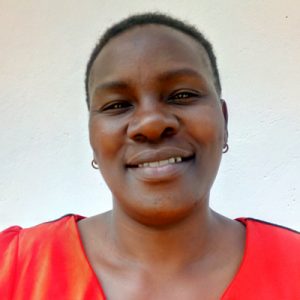March, 2019: Mabanga Primary School Project Complete
There is a new rainwater catchment system at Mabanga Primary School! Students have a source of safe, clean water thanks to your support. Handwashing stations were installed so that students can clean up after using their new latrines, and students and staff have received training in sanitation and hygiene.
Rainwater Catchment Tank
Construction of this new rainwater catchment tank was a big success!
"When Emma walked into my office in October 2018 accompanied by Rev. Flavian, I thought this is another visitor who signs a visitors' book and leaves. When she called in December 2018 for us to sign an MOU (memorandum of understanding), I still was skeptical about the project - but when in January 2019 materials were delivered to the school, I said 'my God you have remembered Mabanga Primary!' You have given the school the most important service, and that's water, since water is life you have given this school life," declared Headteacher Echesa.

Stones are still being gathered so that we can fill in the drainage trench, but that should be done soon too!
It was such a celebration to hand the tank over to the school, especially because it had received its first rains. Students came out of their classrooms and sang and danced in celebration (see video in the Photos section)!

The Process:
Our staff and the school administration started by looking around the school to determine the best location for their new rainwater catchment tank. This needed to be the best site with good, clean roofing to catch the rainwater. The students helped our artisans a lot by gathering the water need to mix cement.

Students dropping off water they got from the river
Then, we cleared the site: excavating the soil within the required measurements to make level ground for the tank foundation. The foundation was cast by laying stones on level ground and then reinforcing it using steel, concrete and waterproof cement.

Both the drawing pipe as well as the washout pipe were affixed as the foundation was lain. The wall was built with ferro-cement techniques through six layers. The inner wall was plastered while rough casting was done on the outer part.

The catchment area was dug, plastered, and a staircase installed so students can easily get water from the tap. A metal cover with a lock was placed over the catchment area to avoid water wastage. The school prefect has one of the keys and will open it when his peers need water.

Dome construction could begin after the superstructure had been given enough time to settle. The manhole cover was fitted, inlet pipes were connected to the roof gutters, inlet screens, ventilation pipes (breathers) and overflow pipes were all done to standard.

Once finished, the tank was given three weeks to undergo complete curing before it was cleaned and handed over to Mabanga Primary School, though we will continue to offer them great support as a part of our monitoring and maintenance program.
Handwashing Stations
Pupils can now enjoy washing their hands with soap thanks to the two handwashing stations that were delivered to their school. These new handwashing opportunities will help reduce cases of hygiene-related illness. The training on hygiene has motivated these students to share what they’ve learned with their peers at school and families at home.

VIP Latrines
This project funded the installation of six new ventilated improved pit latrines. These were all given to the female students since they had the greatest need. All of these new latrines have cement floors that are easy to use and clean. And with a rainwater catchment tank, there should be enough water to keep them clean all the time.
The latrines are very good for the pupils, especially the girl child. Students will have privacy while using the latrines, as the older ones have no doors. We have continued to talk to the headteacher to see if there is any way to put doors on the old ones, even if they are made of iron sheets.

New Knowledge
We planned a hygiene and sanitation training once construction of the rainwater tank and VIP latrines was complete. We worked with the headteacher and the sanitation teacher to select student leaders from classes four through seven. These students will form a student health club that is responsible for sharing what they learned with their peers.
All the participants were eager and ready to learn. The project excited the whole school and we had pupils peeping through the windows to have a glance at what was being done inside the training room.

The students and their teachers needed knowledge on how to improve standards of hygiene and ensure that the sanitation facilities given to them are well-maintained for years to come. Some of the topics we covered included water pollution and treatment methods, handwashing, dental hygiene, operations and maintenance of the facilities, group dynamics, and leadership and governance.

When the facilitator asked students what healthcare means, Milka said that it means "matibabu" (treatment for any disease or ailment). The facilitator explained that healthcare is taking care of personal health, the environment, and hygiene. It is important to take a bath, keep nails short because long nails store germs, keep hair neat, and to air out beds.

Toothbrushing training
On environmental hygiene, we talked about water storage because the school has never had good water storage on school grounds.
The facilitator also showed different pictures of good hygiene practices like covering water storage with a lid, not drinking directly from the storage container, how to cover food with a lid to avoid insects and dogs from eating from the cooking pots, the importance of washing hands, and wearing clean clothes.

When asked about how much water one should drink per day, Yasin said eight glasses but confessed that he only drinks water when at home. That will all change with the rainwater tank - it has been received with so much excitement and the school was so eager for the first rains (which came soon after).
"I never used to wash my hands because there was no water, but now I know the importance of washing my hands to keep away diseases," said Pelinah.
Thank You for making all of this possible!


 Rainwater Catchment
Rainwater Catchment
 Rehabilitation Project
Rehabilitation Project







































